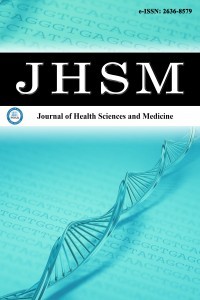Increased gastrointestinal symptom frequency in diabetes mellitus even with good glycemic control
Increased gastrointestinal symptom frequency in diabetes mellitus even with good glycemic control
:Diabetes mellitus, gastrointestinal tract pathology,
___
- 1. Cho NH, Shaw JE, Karuranga S, et al. IDF Diabetes Atlas: Global estimates of diabetes prevalence for 2017 and projections for 2045. Diabetes Research and Clinical Practice. 2018;138:271-81.
- 2. Alam U, Asghar O, Azmi S, Malik RA. General aspects of diabetes mellitus. Handb Clin Neurol. 2014;126:211-22.
- 3. Piper MS, Saad RJ. Diabetes mellitus and the colon. Current treatment options in gastroenterology. 2017;15(4):460-74.
- 4. Horváth VJ, Putz Z, Izbéki F, et al. Diabetes-related dysfunction of the small intestine and the colon: focus on motility. Current diabetes reports. 2015;15(11):94.
- 5. Janatuinen E, Pikkarainen P, Laakso M, Pyorala K. Gastrointestinal symptoms in middle-aged diabetic patients. Scand J Gastroenterol. 1993;28(5):427-32.
- 6. Bytzer P, Talley NJ, Leemon M, Young LJ, Jones MP, Horowitz M. Prevalence of gastrointestinal symptoms associated with diabetes mellitus: a population-based survey of 15,000 adults. Arch Intern Med. 2001;161(16):1989-96.
- 7. Bytzer P, Talley NJ, Hammer J, Young LJ, Jones MP, Horowitz M. GI symptoms in diabetes mellitus are associated with both poor glycemic control and diabetic complications. Am J Gastroenterol. 2002;97(3):604-11.
- 8. Yarandi SS, Srinivasan S. Diabetic gastrointestinal motility disorders and the role of enteric nervous system: current status and future directions. Neurogastroenterol Motil. 2014;26(5):611-24.
- 9. Fujishiro M, Kushiyama A, Yamazaki H, et al. Gastrointestinal symptom prevalence depends on disease duration and gastrointestinal region in type 2 diabetes mellitus. World journal of gastroenterology. 2017;23(36):6694-704.
- 10. Piper MS, Saad RJ. Diabetes Mellitus and the Colon. Curr Treat Options Gastroenterol. 2017;15(4):460-74.
- 11. De Luca L, Zagari RM, Pozzato P, et al. Measuring dyspepsia: a new severity index validated in Bologna. Dig Liver Dis. 2004;36(12):806-10.
- 12. Patrick DL, Drossman DA, Frederick IO, DiCesare J, Puder KL. Quality of life in persons with irritable bowel syndrome: development and validation of a new measure. Dig Dis Sci. 1998;43(2):400-11.
- 13. Rayner CK, Verhagen MA, Hebbard GS, DiMatteo AC, Doran SM, Horowitz M. Proximal gastric compliance and perception of distension in type 1 diabetes mellitus: effects of hyperglycemia. Am J Gastroenterol. 2000;95(5):1175-83.
- 14. Jones KL, Horowitz M, Berry M, Wishart JM, Guha S. Blood glucose concentration influences postprandial fullness in IDDM. Diabetes Care. 1997;20(7):1141-6.
- 15. Locke G. Epidemiology of gastrointestinal complications of diabetes mellitus. European Journal of Gastroenterology and Hepatology. 1995;7(8):711-6.
- 16. Asgharnezhad M, Joukar F, Fathalipour M, et al. Gastrointestinal symptoms in patients with diabetes mellitus and non-diabetic: A cross-sectional study in north of Iran. Diabetes Metab Syndr. 2019;13(3):2236-40.
- 17. Khoshbaten M, Madad L, Baladast M, Mohammadi M, Aliasgarzadeh A. Gastrointestinal signs and symptoms among persons with diabetes mellitus. Gastroenterol Hepatol Bed Bench. 2011;4(4):219-23.
- 18. Kim JH, Park HS, Ko SY, et al. Diabetic factors associated with gastrointestinal symptoms in patients with type 2 diabetes. World journal of gastroenterology. 2010;16(14):1782-7.
- 19. Quan C, Talley NJ, Jones MP, Spies J, Horowitz M. Gain and loss of gastrointestinal symptoms in diabetes mellitus: associations with psychiatric disease, glycemic control, and autonomic neuropathy over 2 years of follow-up. The American journal of gastroenterology. 2008;103(8):2023.
- 20. Talley SJ, Bytzer P, Hammer J, Young L, Jones M, Horowitz M. Psychological distress is linked to gastrointestinal symptoms in diabetes mellitus. Am J Gastroenterol. 2001;96(4):1033-8.
- 21. Quan C, Talley NJ, Jones MP, Howell S, Horowitz M. Gastrointestinal symptoms and glycemic control in diabetes mellitus: a longitudinal population study. Eur J Gastroenterol Hepatol. 2008;20(9):888-97.
- 22. Lona H, Selim S. Prevalence and pattern of gastrointestinal symptoms in patients with diabetes mellitus. IMC Journal of Medical Science. 2017;11(2):56-60.
- 23. Du YT, Rayner CK, Jones KL, Talley NJ, Horowitz M. Gastrointestinal Symptoms in Diabetes: Prevalence, Assessment, Pathogenesis, and Management. Diabetes Care. 2018;41(3):627.
- 24. Ghadiri-Anari A, Gholami S, Zolfaghari F, Namiranian N. Prediabetes and gastrointestinal (GI) symptoms; a cross-sectional study. Diabetes & Metabolic Syndrome: Clinical Research & Reviews. 2019;13(1):844-6.
- 25. Zetina-Lopez A, Custodio-Vazquez A, Hinojosa C, Juarez-Paiz L, Schmulson M. Impact of gastrointestinal symptoms on health related quality of life in patients with type 2 diabetes mellitus. Revista de investigacion clinica; organo del Hospital de Enfermedades de la Nutricion. 2003;55(6):594-9.
- 26. Rodrigues ML, Motta ME. Mechanisms and factors associated with gastrointestinal symptoms in patients with diabetes mellitus. J Pediatr (Rio J). 2012;88(1):17-24.
- 27. Talley NJ, Young L, Bytzer P, Hammer J, Leemon M, Jones M, et al. Impact of chronic gastrointestinal symptoms in diabetes mellitus on health-related quality of life. Am J Gastroenterol. 2001;96(1):71-6.
- 28. Florez H, Luo J, Castillo-Florez S, et al. Impact of metformin-induced gastrointestinal symptoms on quality of life and adherence in patients with type 2 diabetes. Postgraduate medicine. 2010;122(2):112-20.
- Yayın Aralığı: Yılda 6 Sayı
- Başlangıç: 2018
- Yayıncı: MediHealth Academy Yayıncılık
Serum levels of ischemic modified albumin (IMA) and prolidase in migraine subjects
Bahar SAY, Nermin DİNDAR BADEM, Ufuk ERGUN
Increased gastrointestinal symptom frequency in diabetes mellitus even with good glycemic control
Sezai KALKAN, Eylem KARATAY, Erdem AKBAL
